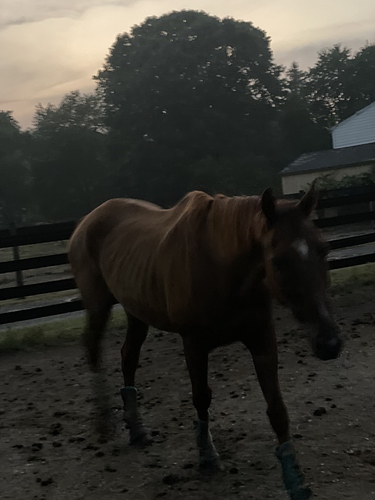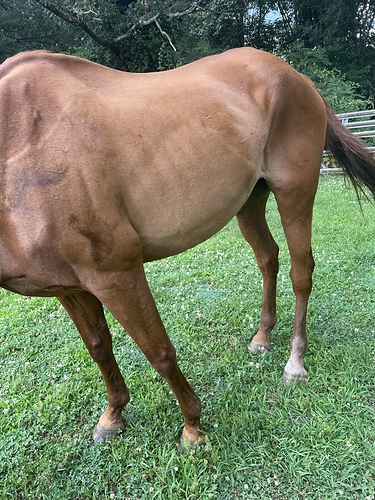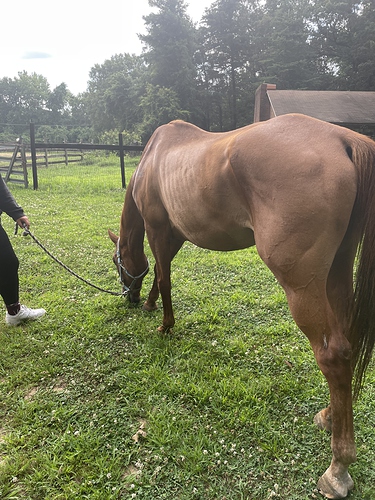I have a 25 year old appendix quarter horse. He has always been a chunky man. But For the last 9 months we have been struggling to keep his weight up. He gets 10 lbs of triple crown senior, 8 lbs of alfalfa cubes, half cup of corn oil, and cool calories. All split up between two feedings. Not sure if it’s worth mentioning here but he’s also on equioxx and electrolytes. He used to weigh about 1,200 lbs now he’s about 1,030. I’ll attach pics for reference. Does anyone suggest any thing else feed wise? Should we increase? Should I have the vet do some blood tests? What should they test for?
Test for PPID - great time here in the late Summer/early Fall
Dental history?
Deworming history?
He had his teeth done last month, had to have a tooth pulled. Vet said it’s probably challenging to eat hay. His food is all soaked and I know he’s definitely eating it all. He gets dewormer every three months.
That’s cushings right? Because i had him tested for that and he doesn’t have it
If the vet thinks it’s probably challenging for him to eat hay, perhaps that’s the cause of his weight loss?
Can he get a third meal with another 3 lbs of the TCS and/or more hay cubes?
Sometimes chronic pain can cause that tucked up look and weight loss. He does look like he is not getting much roughage, probably because he can’t chew it. Have you tried soaked hay cubes and beet pulp?
This. I’d do a basic lameness exam to make sure the Equioxx is adequately managing his pain. I’d also up his forage. This isn’t enough for a horse that isn’t eating/digesting hay. I’d get him on some other hay pellets in addition to the alfalfa. TC recommends starting at 12 lbs/day for a horse that doesn’t eat hay, so you have room to increase there too.
If all of that doesn’t work, I might consider ulcers.
What test, when?
What’s the whole diet? If grinding teeth are a problem, he needs way more quality, soaked feed, and way less to no regular hay. Soaked hay cubes and/or pellets for “hay”
He gets soaked alfalfa cubes about 8lbs a day, and then 10 pounds of triple crown senior (beet pulp based). It’s all soaked. He does eat hay and grass however the vet did say it’s probably challenging for him to eat so I’m not sure how much of it he gets. He’s been checked over time and time again by the vet, we’ve recently increased his grain and she said if we don’t see weight gain in two weeks increase it again. I’m happy to increase how much he eats. I’m just wondering if there could be some underlying cause I haven’t checked for
That is a lot of grain in two feedings–5lbs each feeding, right? He might not be getting the most out of it. Can you split it into 3 feedings? Does he get the 8lbs of soaked alfalfa at the same time as the grain, i.e. 4lbs at a time? If so, that again can contribute to a lot of volume fed at one time vs. stretching it out.
Also, I’ve heard that corn oil is not great for horses… I forget why exactly but I think it is the NSC content. Can you try another oil like Canola? (Ask your vet about the oil type)
I’ve heard really good things about soaked hay stretcher as a weight gain option.
Agree with the other posters that finding a way to get more forage in him would be important.
I would love to split it up between three meals but my barn will only feed morning and night, I can feed him lunch twice a week but unfortunately work 9-5 the other five days a week. I’ll have to explore options and figure out how to get him three meals.
My vet told me the alfalfa cubes is a great source of nutrition and can be fed to replace the hay he’s not eating. She suggested to feed the amount I am feeding. I wouldn’t mind increasing though, he certainly loves it.
Corn oil has the wrong ratio of omega 3 to omega 6. Too much omega 6 in relation to omega 3 can cause inflammation. The ratio should be that the omega 3 > omega 6, and corn oil is just the opposite. I can’t believe how many vets still don’t know this and suggest corn oil.
Better oils are fish oil, coca-soya, or flaxseed or flaxseed oil. The problem with flaxseed oil or ground flaxseed is that it can go rancid quickly. Whole flax - especially in an older horse with teeth issues - will just end up getting passed through.
Triple Crown makes a product called Naturals Golden Ground Flax. https://www.triplecrownfeed.com/products/golden-ground-flax/
It is stabilized flax, so it won’t go rancid quickly - a bag has a 2- year shelf life. My older guy did better on this than on a powdered coca-soya product. He got to be picky as he aged and wouldn’t eat the powdered coca soya. I tried coca-soya oil on his feed, but if I added the amount necessary for weight gain, it was too much to be palpable to him. (And messy!)
He loved the golden flax. What a shine his coat had too! I read somewhere that horses find the golden flax to be tastier than the brown flax.
I know you said you can’t get the barn to do more than 2 feedings, but more feedings did help my horse. He had breakfast, lunch, dinner, and then every night I fed him a late evening meal. Is there a worker at the barn that you could pay a little extra to for feeding him lunch?
In addition to the nutritional suggestions above, I would have the vet run a standard blood panel. At that age, it’s good to establish a base-line for future reference, as well as determine if his kidneys and liver are still functioning at a decent level.
If you assume he isn’t eating much hay or grass, that’s not enough calories.
I would definitely increase something - I’d add alfalfa cubes or pellets.
I might have his teeth looked at again to see if he can grind at all; a tooth missing will change things but a follow up look is a good idea to see how it looks now that the bad tooth is gone. The worst situation would be that there are actually more problems with the tooth gone than with it there.
When was he tested for Cushings, and what were the actual results?
Here’s what I do for seniors who need weight:
Teeth floated ASAP
Deworm with SafeGuard or Panacur
Forage (soaked cubes or pellets if they cannot chew hay/grass) offered 4 times daily or free choice
Beet Pulp or a beet pulp based commercial feed (my fav is Senior Sport by Tribute)
Fly gear to avoid fidgeting/stomping, or reverse turn out.
If I don’t see any change in 2 weeks, or the horse continues to decline, I’ll have the vet out for bloodwork.
I have a 20 year old AQHA/FQHR mare with EPM, Heaves and Arthritis. She is on Equioxx daily now and needs shoes to be competition sound. Currently barefoot as she is giving leadline lessons at home. Jill did well picking weight back up on this plan and has now been bumped back to 1lb Wholesome Blends Ration Balancer and Purina Outlast for commercial feeds, plus 10-12lbs of hay per day unless I have a round bale out.
I’m a huge fan of alfalfa hay for horses who need weight at just about any age. If you are lucky enough to have a farmer or supplier in your area who raises high quality hay, it’s hard to beat for many reasons, as long as your horses teeth are still good.
Corn oil is basically all Omega 6, which horses don’t need more, and what I wouldn’t be using for any horse in large amounts (a few tbsp for coat shine is fine). Oil is 100% fat, no sugar or starch 
Canola is the “best” in terms of cost vs benefits. It’s cheap, it’s 2:1 Omega 6:3 which is the best ratio of all the oils that have more O6 than O3
Vets usually have no clue on any of this 
Agree with this, and since it’s just hay, you can feed more if needed. How much time is he allowed to eat his meals?
“Vet said it’s probably challenging to eat hay.” 
This is very helpful thank you! It sounds like I should offer him more alfalfa cubes. I’ll take all of your suggestions and hope I see an improvement. I’m thinking I’ll need to have a fill blood panel done as well anyway to rule anything else out
He has unlimited time to eat  he gets fed out in the field
he gets fed out in the field
Any pre/probiotics? Source makes a supplement called Focus Sr. that helped my late guy. It includes probiotics, digestive enzymes, flax and Source.
Recheck your ACTH test and read up on Cushing’s. The accepted levels change depending on the time of year tested.



